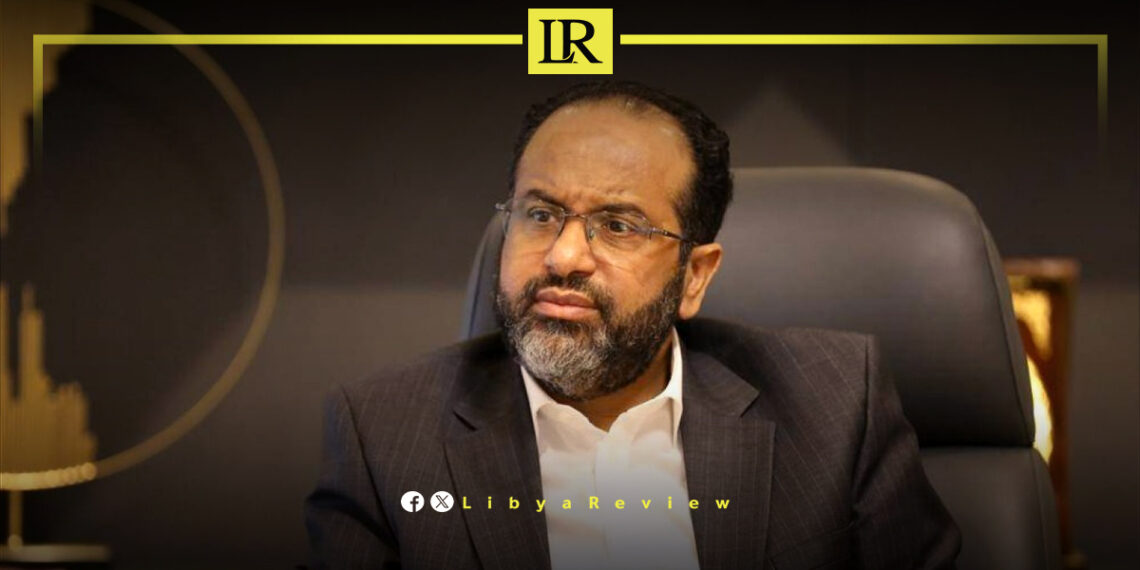Salem Al-Zadma, Deputy Prime Minister of the Libyan government appointed by the House of Representatives, outlined a “prescription” for resolving Libya’s ongoing crises, emphasizing that “the only solution lies in comprehensive dialogue that takes into account the concerns of all political parties.”
In an interview with Asharq Al-Awsat, Al-Zadma defended the position of the authorities in eastern Libya regarding the closure of oil fields and ports, arguing that it was a measure taken to “preserve the livelihoods of citizens.” Responding to those who describe his government as the “Government of Haftar’s Sons,” he stated that it “represents all Libyans” and noted that it extends administrative control over two-thirds of Libya’s territory.
The oil shutdown, according to Al-Zadma, resulted from unilateral actions by the Presidential Council that violated Libya’s effective laws and political agreement. This situation forced the government to declare a state of force majeure over the oil fields and ports due to increased risks posed by individuals without legal standing taking control of Libya’s state revenues. He clarified that the Libyan government did not use oil as a political tool but sought to protect the livelihoods of Libyans.
In addressing financial resources, Al-Zadma explained that the government submitted a budget proposal to the House of Representatives, which approved it and enacted a budget law. Part of the development funds was then transferred to the Ministry of Planning and Finance by the Central Bank of Libya, providing the necessary resources for government spending.
When asked about the “Government of Haftar’s Sons” label, Al-Zadma asserted that the Libyan government is a result of an agreement between the House of Representatives and the High Council of State, in accordance with the Skhirat political agreement. He emphasized that his government is legitimate and represents all Libyans, extending its administrative control over two-thirds of the country’s territory. Despite political rhetoric, the government continues to prove its commitment to representing a significant portion of the Libyan population through developmental projects and reconstruction efforts in the west, east, and south.
To revive the political process in Libya, Al-Zadma stressed the importance of a comprehensive dialogue that considers the concerns of all political parties. This dialogue must reject zero-sum thinking and aim for a political agreement that ultimately leads to presidential and parliamentary elections, ensuring representation for all.
On the issue of unifying the executive authority, Al-Zadma expressed that it has become an urgent necessity to overcome the political and institutional division in the country. He believes that success depends on selecting a unified government through a comprehensive political dialogue under the UN’s auspices, with mechanisms in place to ensure consensus and reflect Libya’s political diversity.
Addressing concerns from the south, Al-Zadma highlighted the government’s efforts to enhance security, improve working conditions, and address essential needs in sectors like health and education. Despite limited resources, the current government has provided more for the south than previous administrations.
The Reconstruction Conference for the South, overseen by the Development and Reconstruction Fund of Libya, is part of the government’s broader strategy to develop infrastructure and launch large-scale investment projects, with the aim of reducing migration from the south to the north and encouraging reverse migration.
Given the recent floods in some southern cities, the government has prioritized infrastructure reconstruction in its efforts, maintaining constant communication with the Development and Reconstruction Fund. However, political instability continues to pose challenges to development and reconstruction efforts. Equitable wealth distribution and decentralized governance are crucial to ensuring the implementation of necessary projects that meet the needs of various regions.
Al-Zadma also addressed the recent military operation conducted by the Libyan National Army’s Ground Staff in the southwest, stating that it is part of a broader security plan led by Field Marshal Khalifa Haftar to secure Libya’s southern borders. The operation, covering cities such as Sebha, Ghat, Ubari, and Murzuq, is focused on securing the borders and enhancing local security in light of tensions in neighboring countries. Al-Zadma clarified that the operation had no political motives and was solely aimed at ensuring the safety of the nation and its citizens.


